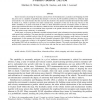Free Online Productivity Tools
i2Speak
i2Symbol
i2OCR
iTex2Img
iWeb2Print
iWeb2Shot
i2Type
iPdf2Split
iPdf2Merge
i2Bopomofo
i2Arabic
i2Style
i2Image
i2PDF
iLatex2Rtf
Sci2ools
135
click to vote
IJRR
2007
2007
Exactly Sparse Extended Information Filters for Feature-based SLAM
Recent research concerning the Gaussian canonical form for Simultaneous Localization and Mapping (SLAM) has given rise to a handful of algorithms that attempt to solve the SLAM scalability problem for arbitrarily large environments. One such estimator that has received due attention is the Sparse Extended Information Filter (SEIF) by Thrun et al., which is reported to be nearly constant time, irrespective of the size of the map. The key to the SEIF’s scalability is to prune weak links in what is a dense information (inverse covariance) matrix to achieve a sparse approximation that allows for efficient, scalable SLAM. We demonstrate that the SEIF sparsification strategy yields error estimates that are overconfident when expressed in the global reference frame, while empirical results show that relative map consistency is maintained. In this paper, we propose an alternative scalable estimator based in the information form that maintains sparsity while preserving consistency. The pa...
Related Content
| Added | 15 Dec 2010 |
| Updated | 15 Dec 2010 |
| Type | Journal |
| Year | 2007 |
| Where | IJRR |
| Authors | Matthew Walter, Ryan Eustice, John J. Leonard |
Comments (0)

